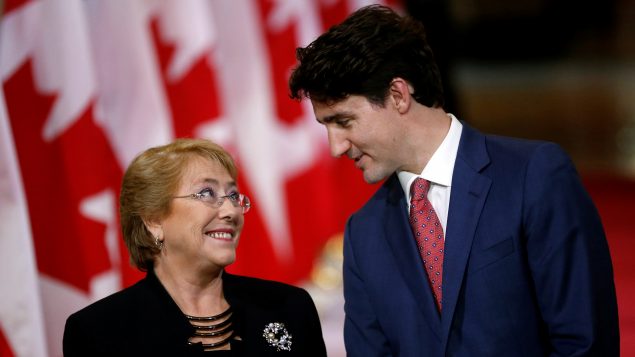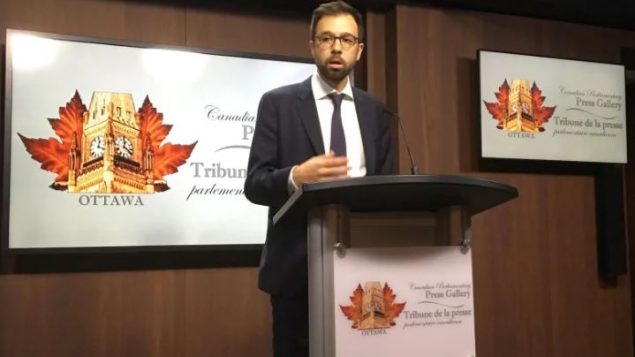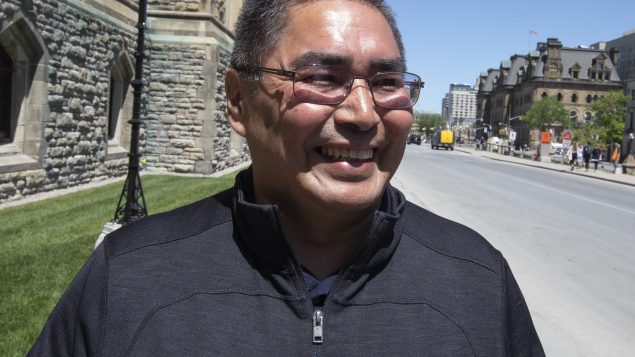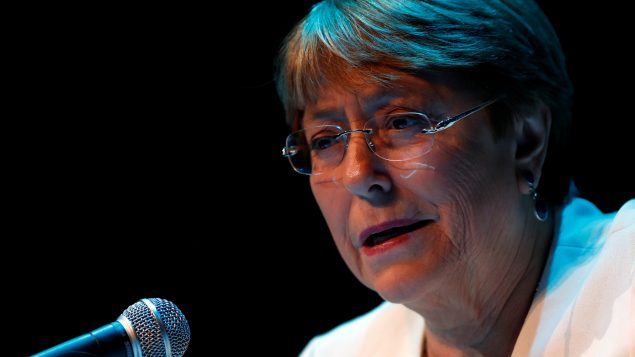The United Nations High Commissioner for Human Rights, Michelle Bachelet, will visit Canada next week to discuss efforts to protect human rights and promote gender equality around the world, the Prime Minister’s Office announced Tuesday.
During her four-day visit the former two-term Chilean president will meet with Prime Minister Justin Trudeau, according to the PMO.
“High Commissioner Bachelet is a long-standing defender of human rights and a champion for gender equality around the world,” Trudeau said in a statement. “I look forward to meeting with her to discuss how we can continue to advance human rights, protect those most vulnerable, and build a world where all people are equally safe and free.”

Canada’s Prime Minister Justin Trudeau (R) talks to Chile’s President Michelle Bachelet in the Hall of Honour on Parliament Hill in Ottawa, Ontario, Canada, June 5, 2017. (Chris Wattie/REUTERS)
Bachelet’s visit comes barely two weeks after a UN human rights expert slammed Ottawa’s efforts to prevent discrimination from the toxic impacts of business activities.
The United Nations Special Rapporteur on human rights and hazardous substances, Baskut Tuncak, said Canada’s Indigenous people are disproportionately affected by toxic waste.
“There is a pervasive pattern of inaction of the Canadian government in the face of unquestionable risks and injustices from the cumulative impacts of toxic exposures,” Tuncak said at a press conference on June 6, presenting the preliminary findings following his two-week visit to Canada.
“Indigenous peoples, the poor, children, older persons, workers, and people with disabilities are at grave risk of impacts on their human rights, compounded by a general inability to access justice that must be addressed.”

Baskut Tuncak, United Nations special rapporteur on human rights and hazardous substances and wastes. (Olivia Stefanovich/CBC)
He was in Canada at the invitation of the federal government, from May 24 to June 6, 2019.
Tuncak visited Ottawa, Toronto, Vancouver, Edmonton and Montréal, along with Grassy Narrows and Sarnia in Ontario and Fort McMurray in Alberta, to meet with governments, academics, Indigenous communities and businesses.
During the press conference Tuncak highlighted the ongoing delay in remediating 10 tons of mercury contamination that dates back 50 years and continues to poison the Asubpeeschoseewagong and other First Nations in north-western Ontario.
“The case of Grassy Narrows and White Dog is emblematic in the overall pattern of government inaction in the face of grave risks to the health of indigenous peoples,” he said. “The government has not adequately explained their inaction, and why as such it should not be considered discrimination.”

Chief Rudy Turtle of Grassy Narrows First Nations talks to reporters on Parliament Hill in Ottawa on Thursday, June 6, 2019. (Fred Chartrand/THE CANADIAN PRESS)
The UN expert also discussed the impacts of extractive industries on human health and wildlife, elevated incidences of diseases among Indigenous peoples linked to oil sands extraction in Alberta, the Trans Mountain Pipeline Expansion project in British Columbia, the historical injustices against the Aamjiwnaang First Nation in Sarnia’s “Chemical Valley”, impacts of aerial spraying of pesticides on Indigenous lands and the Muskrat Falls hydroelectric project, among others.
A full report on Tuncak’s mission is expected to be released at the September 2020 session of the UN Human Rights Council.
The special rapporteur’s preliminary findings came the same week the four commissioners of the National Inquiry into Missing and Murdered Indigenous Women and Girls accused Canada of genocide against Indigenous people.
With files from CBC News







For reasons beyond our control, and for an undetermined period of time, our comment section is now closed. However, our social networks remain open to your contributions.